|
|
|
Sort Order |
|
|
|
Items / Page
|
|
|
|
|
|
|
| Srl | Item |
| 1 |
ID:
092229
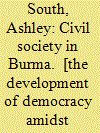

|
|
|
|
|
| Publication |
Washington, DC, East-West Centre, 2008.
|
| Description |
xii, 78p.
|
| Standard Number |
9789812309044
|
|
|
|
|
|
|
|
|
|
|
|
Copies: C:1/I:0,R:0,Q:0
Circulation
| Accession# | Call# | Current Location | Status | Policy | Location |
| 054596 | 321.80591/SOU 054596 | Main | On Shelf | General | |
|
|
|
|
| 2 |
ID:
083547
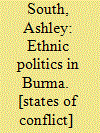

|
|
|
|
|
| Publication |
London, Routledge, 2008.
|
| Description |
xxiv, 277p.
|
| Series |
Routledge contemporary Southeast Asia series; No. 19
|
| Standard Number |
9780415410083
|
|
|
|
|
|
|
|
|
|
|
|
Copies: C:1/I:0,R:0,Q:0
Circulation
| Accession# | Call# | Current Location | Status | Policy | Location |
| 053956 | 305.8009591/SOU 053956 | Main | On Shelf | General | |
|
|
|
|
| 3 |
ID:
140276
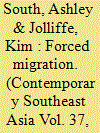

|
|
|
|
|
| Summary/Abstract |
Ethnic armed conflict has plagued southeast Myanmar for over sixty-five years, and has been the cause of significant and repeated episodes of forced migration. The dynamics of forced migration have undergone profound changes in the region since 2012, following the signing of bilateral ceasefire agreements between the government and several Ethnic Armed Groups (EAGs). Within this context, this article describes and analyses the decision-making processes and approaches to return, resettlement and rehabilitation of forced migrants — Internally Displaced People (IDPs) and refugees. In relation to academic and policy literatures on local agency and humanitarian protection, we argue that forced migrants in and from Myanmar demonstrate great resilience and significant capacities for self-protection and that external support should be geared towards supporting local coping strategies and attempts to achieve dignified and “durable solutions” to their plight. This approach requires an in-depth exploration of local contexts, and forced migrants’ decision-making processes. We present a typology of conflict-induced forced migrants in and from southeast Myanmar, followed by an analysis of five main factors that influence their decisions, and help to explain some of the key differences between different types.
|
|
|
|
|
|
|
|
|
|
|
|
|
|
|
|
| 4 |
ID:
144913
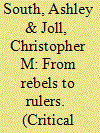

|
|
|
|
|
| Summary/Abstract |
This article presents a critical comparison of the ongoing peace processes in the southern Philippines and Myanmar (Burma). It does so by examining two key armed groups: the Moro Islamic Liberation Front (MILF) on Mindanao, and the Karen National Union (KNU) in Myanmar. We identify common elements that help to explain the relative – albeit incomplete – success of these two groups in navigating their respective peace processes. The MILF and KNU are ethnonationalist armed groups struggling for self-determination against states that are experienced by ethnic minority communities as culturally alien, and economically and politically dominant. Both conflict actors are characterized by complex combinations of “greed” and “grievance” factors but nevertheless enjoy significant (albeit contested) political legitimacy among the communities they seek to represent. We explore the complex relationships between armed ethnic groups, conflict-affected communities, and civil society actors. We argue that engagement with civil society is a key element of success in the Mindanao peace process, which could be replicated in Myanmar. We examine the roles and changing nature of the state in the Philippines and Myanmar, and contrast the degrees of international involvement, as key variables in these peace processes. We observe that negotiations of comprehensive peace settlements are threatened by “the tyranny of elections” in Myanmar (2015) and the Philippines (2016), and observe the importance of including national parliaments in peace processes in a timely manner. The peace process between Manila and the MILF represents a rare example of a Muslim minority pursuing its political objectives through structured dialogue. The article focuses on the challenges faced by armed groups moving from insurgency to reinvent themselves as credible political actors and governance authorities. Our analysis draws on peace-building literature, specifically the phenomenon of “rebel governance.”
|
|
|
|
|
|
|
|
|
|
|
|
|
|
|
|
| 5 |
ID:
076579
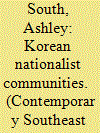

|
|
|
| 6 |
ID:
143897
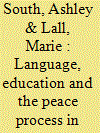

|
|
|
|
|
| Summary/Abstract |
This article analyses the relationship between the politics of education and language, and armed conflict and ongoing peace process in Myanmar. It discusses the state education system, which since the military coup of 1962 has promoted the idea of the country based on the language and culture of the Bamar (Burman) majority community, and the school systems developed by ethnic armed groups which oppose the military government. Ethnic opposition education regimes have developed mother tongue-based school systems. In some cases, the Mon for example, these broadly follow the government curriculum, while being locally owned and delivered in ethnic languages; in others, such as the Karen, the local education system diverges significantly from the Myanmar government curriculum, making it difficult for students to transition between the two systems. This article explores the consequences of these developments, and how reforms in Myanmar since 2011 — including the peace process, which remains incomplete and contested — have opened the space for educational reform, and the possible “convergence” of state and non-state education regimes. Ethnic nationality communities remain determined to conserve and reproduce their own languages and cultures, adopting positions in relation to language and education which reflect broader state-society relations in Myanmar, and in particular ethnic politicians’ demands for a federal political settlement to decades of armed conflict. The article concludes that sustainable resolution to Myanmar’s protracted state-society conflict is unlikely to be achieved until elites can negotiate agreement on ethnic language and teaching policies.
|
|
|
|
|
|
|
|
|
|
|
|
|
|
|
|
| 7 |
ID:
053171
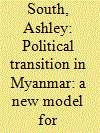

|
|
|
| 8 |
ID:
112945
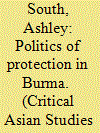

|
|
|
|
|
| Publication |
2012.
|
| Summary/Abstract |
This article explores how people living in areas of Burma/Myanmar affected by armed conflict (Karen populations in the southeast) and natural disaster (Cyclone Nargis in the Irrawaddy Delta) understand "protection" and act to minimize risks and protect themselves, their families, and communities. What do vulnerable people seek to protect, and how do they view the roles of other stakeholders, including the state, non-state actors (armed and political groups), community-based organizations, and national and international aid agencies? Are these viewed as protection actors, or sources of threat-or a mixture of both?
|
|
|
|
|
|
|
|
|
|
|
|
|
|
|
|
|
|
|
|
|